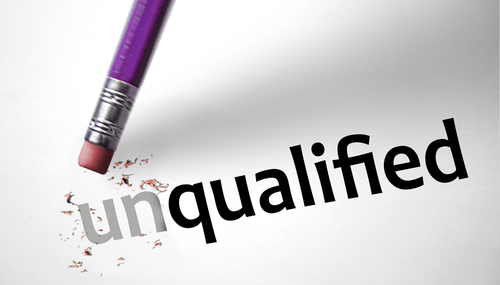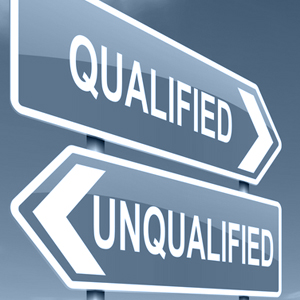Clinical research professionals have to be qualified professionals. Although that statement as such finds no objections, what constitutes ‘qualified’ is not universally agreed upon.
ICH-GCP, Good Clinical Practice, tells us that professionals have to be qualified by education, experience and training (ICH-E6(R2)1, 2.8, 4.1.1/5.6.1/5.18.2/5.19.2). What kind and how much of each is not specified. Not in GCP, and nowhere in internationally agreed guidelines.
With regards to education, let’s look at clinical research associates (CRA’s). A large group of clinical research professionals. The educational requirements for that job are unclear. In some parts of the world, physicians are hired as CRA’s. Elsewhere, trained nurses and physical therapists perform very well in the same positions. Is a university degree a requirement for a CRA? Or is the hiring expectation more set by what educational level is available at that time and place?
Looking at investigators, the expected educational level is almost as unclear as that for CRA’s. ICH-GCP does not require an investigator to be a physician. On the contrary, there’s language (ICH-E6(R2)1, 4.3.1) in GCP on the expectations when the investigator is NOT a physician. Regardless, many sponsors and CROs require a medical degree for someone to be considered as an investigator. Where, depending on the trial, experienced nurse practitioners, for example, could be excellent investigators, given the chance.
And what about the experience? How much experience is expected of investigators? Do they have to have experience as sub-investigator (SI) before being able to perform as a Principle Investigator (PI)? When auditing, I see many PI CVs that don’t contain any information about their previous clinical research experience. No listing of the number of trials they have worked on as SI or as PI. So what minimal requirement has the sponsor or CRO defined for investigators to be able to be recruited as PI on their trials?
And much the same goes for CRA’s. I see many CRA’s being sent out independently to go monitor a trial after minimal training for that job. Is there a minimum expectation of (co-)monitoring visits to be done under guidance, before being able to go out alone? I have not been able to find any standards. Companies often make it easy on themselves, asking for experience before hiring. How much experience depends on what is available on the market. How that experience was gained is often not looked at. I would venture to say that a CRA, sent out independently with limited or no experience, is after a year or two by no means automatically qualified by experience.
Experience, once gained, does not last if not maintained. How long without experience cancels out previous experience? And does experience in one role prepare someone for another role in the same field of work? For example, does experience as a Clinical Trial Administrator (CTA) make someone more qualified for a role as CRA than a well trained inexperienced person?
Experience in the field gains knowledge, and so does training. It does not make one qualified by experience for a different role.
On what is needed, training is probably the foggiest one of the three. In general, GCP training is considered a requirement. This is sometimes even required of someone who’s performing their normal work, but now in the context of a trial, without any significant trial-related aspects to it. Like a lab technician drawing routine blood for the purpose of a trial. Do they need GCP training to do their regular job?
Even vaguer is what GCP training makes a person qualified. Way too often, GCP training is done as a tick-box activity. It needs to be out of the way. Clicking through a free online, or company e-learning, without really learning something already provides ‘evidence of training’. There is no need for passing a knowledge test, nor is anyone asking whether the ‘trained’ person has insight into what the purpose of GCP is and the objective of GCP compliance.
GCP training then needs to be ‘current’. Whatever that may be. Often this is interpreted as training being done within the past 2 years. However, this is arbitrary. Because nobody is looking at how used someone is to working according to GCP and surrounding legal requirements.
 It’s been 30 years since I passed my drivers license. I haven’t had to retrain on driving since. I’ve driven a car since, and do think that I’m qualified to be present on the roads in my car. However, it’s only been 12 years or so since I got my motorbike drivers license. I have not driven a motorbike in years, and I am certainly not qualified to get on a bike now and start driving on the highways and byways.
It’s been 30 years since I passed my drivers license. I haven’t had to retrain on driving since. I’ve driven a car since, and do think that I’m qualified to be present on the roads in my car. However, it’s only been 12 years or so since I got my motorbike drivers license. I have not driven a motorbike in years, and I am certainly not qualified to get on a bike now and start driving on the highways and byways.
This illustrates that we should not be looking at the individual aspects of qualified separately, the way it is often done. The combination of training with continued experience makes a more qualified clinical research professional than someone whose last experience was 4 years ago, but who did have GCP training in the past year.
Verifying qualifications is not a tick-box activity, just the same as how ICH-GCP training is not a tick-box activity. As ICH-GCP states, someone should be qualified by a combination of education, training and experience.
As an auditor, when I see that someone is not GCP trained recently, however, does have continuous experience with clinical trial work, I’m not raising an observation on this person’s qualifications. Of course, as ICH-GCP has had its R2 addendum published in late 2016, I would expect professionals to have received training on the addendum since then. But if they received their training in 2017, nothing changed after that.
It is much more valuable for clinical research professionals to consciously maintain their knowledge levels. Read about what’s going on in clinical research. Ask questions. Revisit the way they do things regularly. Actively work to keep their working quality level high. That makes a qualified professional.
And as for the standards, the industry is keeping? It would be good if we could get some harmonisation in what education and training are expected. What experience suffices for independent work.
The Dutch Clinical Research Foundation (DCRF) is one organisation that has actively worked to establish a competency expectation for a starting CRA. This matrix2 lists (in Dutch) what knowledge is needed, what insight, what experience, and what capabilities. They’ve done the same for the role of the local (on-site) data manager3.
I’m sure that, around the world, more of those overviews of what makes a person qualified for a role exist. However, harmonisation of that, or industry standards are sorely lacking.
At this moment, I’m not getting into continuous learning. That’s a topic for another time. For now, challenge the way qualifications are reviewed at your organisation. Is it being looked at in a balanced, justified way? Are you looking at education, experience, and training in a balanced way? Are we not asking well-qualified professionals to undergo additional training for no other purpose than that the box is ticked? Because you know this is happening! And this leads to a lot of frustration, and time and money wasted.
And what clinical research has too much of is frustration, and little of is time and money. Pragmatism is the keyword here. Have a well-considered strategy in considering the real qualifications.

